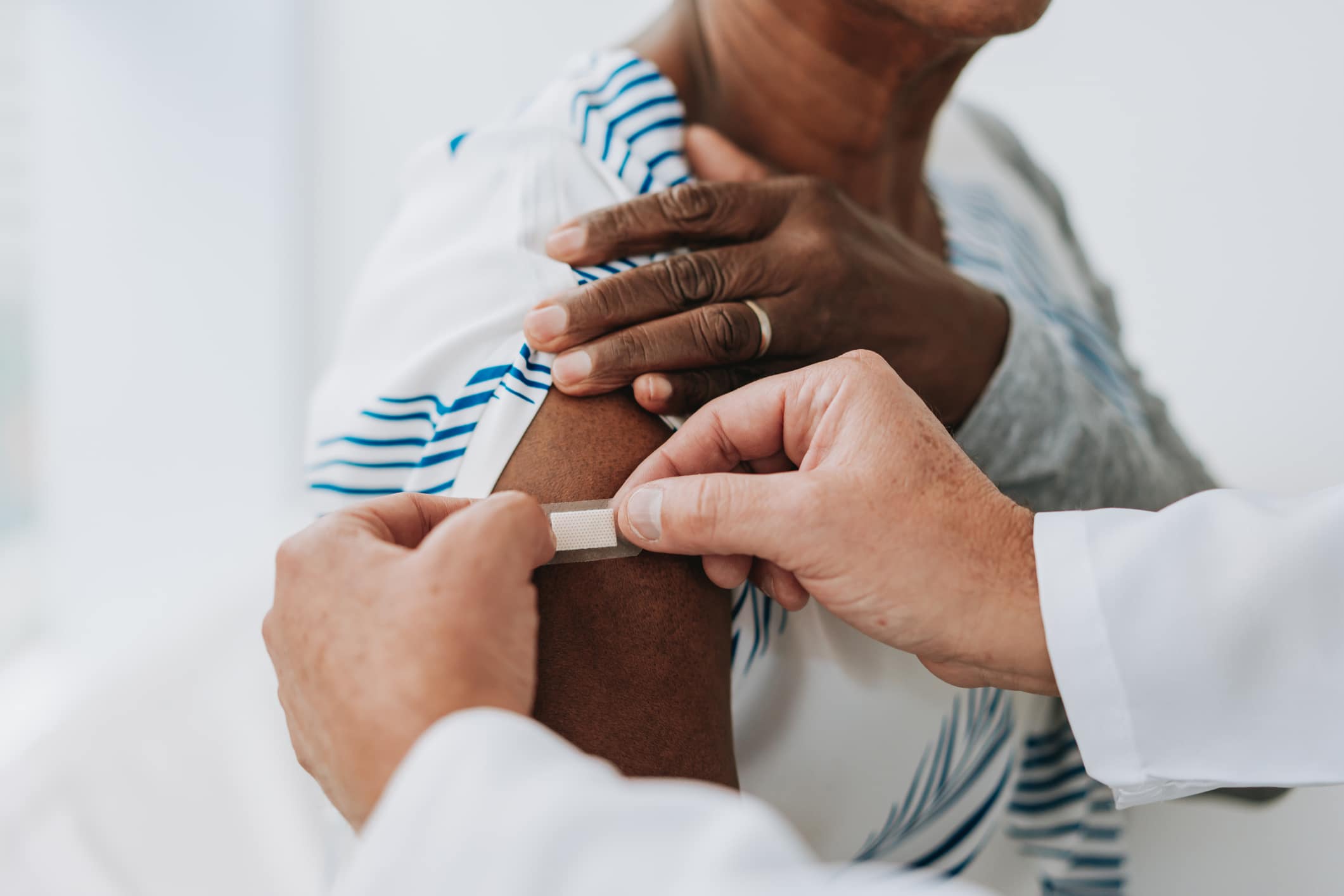As we age, our immune system naturally weakens, making us more susceptible to infections and diseases [1]. This is why older adults need to receive recommended vaccinations. Vaccines not only protect the individual from potentially life-threatening illnesses, but they also help prevent the spread of disease to others in the community. It is important to understand the necessary vaccines for older individuals and how they help boost our immune system to support overall well-being.
How Does the Immune System Weaken With Age?
Cellular senescence, a process where cells lose their ability to divide and function properly, plays a role in the decline of immune cell function [2]. The thymus, crucial for T-cell maturation, shrinks and becomes less active, leading to reduced production of key immune cells. Additionally, B-cells, responsible for antibody production, may become less efficient, leaving older individuals more susceptible to infections. Chronic inflammation associated with aging further hampers the immune system’s effectiveness.
Why are Vaccines Important for Older Adults? [3]
Vaccines act as a training ground for the immune system, stimulating a targeted response by introducing harmless components of pathogens. For older adults, whose immune systems may not respond as robustly, vaccines are crucial in boosting their ability to fight off new challenges.
Vaccines for older adults are important for:
- Boosting Immune Response: Vaccines act as a training ground for the immune system. By introducing harmless components of pathogens, vaccines stimulate the immune system to produce a targeted response. This is particularly important for older adults, whose immune systems may not respond as robustly to new challenges.
- Protecting Against Severe Illness: Age often brings a higher risk of severe outcomes from infectious diseases. Vaccines can significantly reduce the severity of illnesses and decrease the likelihood of complications, hospitalizations, and even fatalities.
- Herd Immunity: By getting vaccinated, older adults contribute to the establishment of herd immunity, protecting not only themselves but also those who may be more vulnerable to infections, such as individuals with compromised immune systems.
- Tailored Vaccinations for Older Adults Programs: Recognizing the unique needs of older adults, healthcare professionals may recommend specific vaccines, such as those targeting influenza, pneumonia, and shingles. These vaccines are designed to provide additional protection against infections that pose a higher risk to older individuals.
Recommended Vaccines for Older Adults[4]
Navigating the golden years demands a proactive approach to health, and prioritizing vaccinations is essential. The recommended vaccinations for older adults form a comprehensive shield against a spectrum of preventable diseases, reducing the risk of complications and enhancing overall quality of life.
Influenza (Flu) Vaccine
At the forefront of vaccinations for older adults stands the influenza vaccine. The flu, though often dismissed as a common ailment, can have severe complications for seniors, leading to hospitalization or even fatalities. The influenza vaccine is meticulously crafted each flu season to combat the specific strains of the influenza virus prevalent, significantly reducing the risk of infection and its associated complications.
Pneumococcal Vaccines
Pneumococcal diseases, including pneumonia, are formidable adversaries for older adults. Recognizing this, the Centers for Disease Control and Prevention (CDC) recommends two pneumococcal vaccines for seniors – Pneumococcal Conjugate Vaccine (PCV13) and Pneumococcal Polysaccharide Vaccine (PPSV23). These vaccines offer a robust defense against various strains of the bacteria Streptococcus pneumoniae, mitigating the risk of pneumonia, meningitis, and bloodstream infections.
Shingles (Herpes Zoster) Vaccine
Shingles, a painful rash caused by the varicella-zoster virus, become more prevalent and severe with age. The shingles vaccine, recommended for adults aged 50 and older, acts as a shield against this painful and potentially debilitating condition. Beyond the rash, the associated pain can persist long after healing, leading to a condition known as postherpetic neuralgia. Vaccinations are a crucial step in preventing both the initial outbreak and its lingering consequences.
Tetanus, Diphtheria, and Pertussis (Tdap) Vaccine
While commonly associated with childhood vaccinations, tetanus, diphtheria, and pertussis remain potential threats throughout life. The Tdap vaccine, recommended for adults, including older adults who may not have received a pertussis-containing vaccine as an adult, serves as a shield against these potentially serious bacterial infections. This includes protection against lockjaw (tetanus), severe respiratory issues (diphtheria), and prolonged coughing spells (pertussis).
Hepatitis Vaccines
Hepatitis A and B pose significant threats, especially for older adults. Hepatitis A is typically contracted through contaminated food or water, while hepatitis B is often transmitted through blood or other bodily fluids. Vaccination for older adults against both hepatitis A and B is recommended, offering protection against these potentially life-threatening infections and ensuring a healthier and more secure future.
Meningococcal Vaccine
Meningococcal disease, encompassing meningitis, presents a particular danger for older adults. The meningococcal vaccine, recommended for individuals with certain risk factors, such as compromised immune systems or those living in communal settings, provides protection against several strains of the bacteria Neisseria meningitidis. This protection is crucial in preventing infections of the lining of the brain and spinal cord, which can have severe consequences.
Vaccines for Older Adults at Greater Good Health
At Greater Good Health, we believe in empowering older adults to take charge of their well-being. Protecting yourself and your loved ones is as simple as getting vaccinated. Schedule your vaccination appointment today with our senior primary care services. Together, let’s build a stronger and healthier community. Find a primary care clinic near you, and contact us today.


